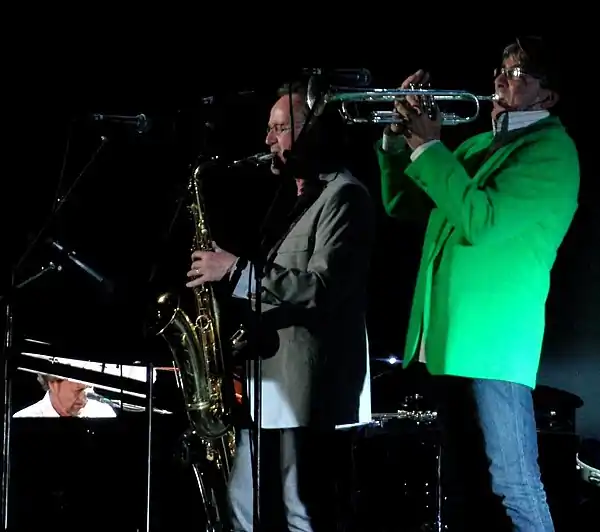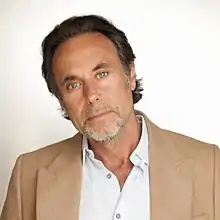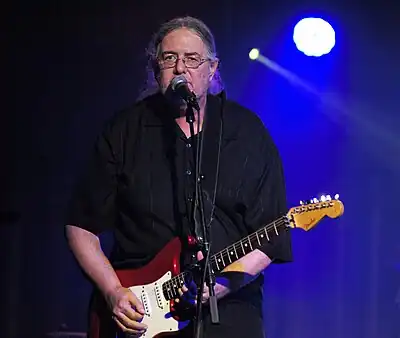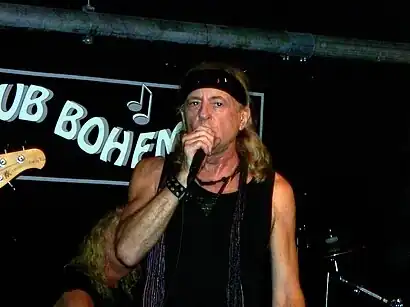
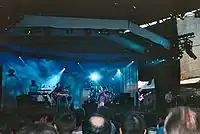
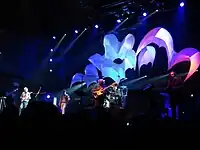
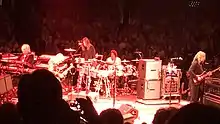
Yes are an English progressive rock band founded in 1968 by lead singer Jon Anderson, bassist Chris Squire, guitarist Peter Banks, keyboardist Tony Kaye, and drummer Bill Bruford. The band's current line-up includes guitarist Steve Howe (who first joined in 1970), keyboardist Geoff Downes (who first joined in 1980), bassist Billy Sherwood (since 2015, formerly guitarist/keyboardist, who first joined in 1994 as a touring member, and as official member in 1997), lead singer Jon Davison (since 2012) and drummer Jay Schellen (who first joined in 2016 as touring member, and as official member since 2023).
History
1968–1981
The band formed out of psychedelic rock band Mabel Greer's Toyshop in 1968, with the line-up of Anderson, Squire, Banks, Kaye and Bruford. In September, Bruford decided to quit performing to study at the University of Leeds.[1] His replacement, Tony O'Reilly of the Koobas, struggled to perform with the rest of the group on stage and former Warriors and future King Crimson drummer Ian Wallace subbed for one gig on 5 November 1968.[1] After Bruford was refused a year's sabbatical leave from Leeds, Anderson and Squire convinced him to return for Yes's supporting slot for Cream's farewell concert at the Royal Albert Hall on 26 November.[1]
This line-up released two albums, Yes[2] and Time and a Word, the later of which included a 20-piece youth orchestra.[3] Banks left the group on 18 April 1970, just three months before the album's release. Having expressed dissatisfaction with the idea of recording with an orchestra,[4][5] Banks later indicated that he was fired by Anderson and Squire, and that Kaye and Bruford had no prior knowledge that it would be happening.[6] Banks' replacement was Tomorrow guitarist Steve Howe, who appears in the photograph of the group on the American issue despite not having played on it.[7] This line-up released The Yes Album, friction arose between Howe and Kaye on tour;[8] this, along with Kaye's reported reluctance to play the Mellotron and the Minimoog synthesizer, preferring to stick exclusively to piano and Hammond organ,[9] led to the keyboardist being fired from the band in the summer of 1971. At the time of Kaye's departure, Yes had already found their new keyboardist—Rick Wakeman, a classically trained player who had left the folk rock group Strawbs earlier in the year. He was already a noted studio musician, with credits including T. Rex, David Bowie, Cat Stevens and Elton John.
Fragile, was recorded by the new line-up and was released in November 1971,[10] followed by Close to the Edge in September 1972. The growing critical and commercial success of the band was not enough to retain Bruford, who left Yes in the summer of 1972, before the album's release, to join King Crimson. The band considered several possible replacements, including Aynsley Dunbar (who was playing with Frank Zappa at the time),[11] and decided on former Plastic Ono Band drummer Alan White, a friend of Anderson and Offord who had once sat in with the band weeks before Bruford's departure.[12]
Tales from Topographic Oceans was the band's sixth studio album, released on 7 December 1973.[13] Wakeman left the band after the 1973–1974 tour; his solo album Journey to the Centre of the Earth topped the UK charts in May 1974.[14] Several musicians were approached to replace Wakeman, including Vangelis Papathanassiou, Eddie Jobson of Roxy Music and former Atlantis/Cat Stevens keyboardist Jean Roussel. Howe says he also asked Keith Emerson, who did not want to leave Emerson, Lake & Palmer.[15] Yes ultimately chose Swiss keyboardist Patrick Moraz of Refugee, who arrived in August 1974[16] during the recording sessions for Relayer.
In late 1976, the band travelled to Switzerland and started recording for their album Going for the One. It was then that Anderson sent early versions of "Going for the One" and "Wonderous Stories" to Wakeman, who felt he could contribute to such material better than the band's past releases. Moraz was let go, after Wakeman was booked, initially on a session musician basis. Upon its release in July 1977, Going for the One topped the UK album charts for two weeks.[17]
Tormato was released in September 1978, Despite internal and external criticisms of the album, the band's 1978–1979 tour was a commercial success. In October 1979, the band convened in Paris with producer Roy Thomas Baker. Their diverse approach was now succumbing to division, as Anderson and Wakeman favoured the more fantastical and delicate approach while the rest preferred a heavier rock sound. Howe, Squire and White liked none of the music Anderson was offering at the time as it was too lightweight and lacking in the heaviness that they were generating in their own writing sessions. The Paris sessions abruptly ended in December after White broke his foot while rollerskating in a roller disco.[18] When the band, minus Wakeman (who had only committed to recording keyboard overdubs once new material would be ready to record), reconvened in February to resume work on the project, their growing musical differences, combined with internal dissension, obstructed progress.[19] Eventually, a serious band dispute over finance saw Anderson leave Yes, with a dispirited Wakeman departing at around the same time.
In 1980, pop duo The Buggles (keyboardist Geoff Downes and singer Trevor Horn) secured the services of Brian Lane, who had managed Yes since 1970, as their manager. At this point, the departure of Anderson and Wakeman had been kept secret from everyone outside the Yes inner circle. Seeing an option of continuing the band with new creative input and expertise, Squire revealed the situation to Horn and Downes and suggested that they join Yes as full-time members. Horn and Downes accepted the invitation and the reconfigured band recorded the Drama album, which was released in August 1980.
After the Drama tour, Yes reconvened in England to decide the band's next step, beginning by dismissing Lane as their manager. Horn was also dismissed,[20] and went on to pursue a career in music production, with White and Squire next to depart. Left as the sole remaining members, Downes and Howe opted not to continue with the group and went their own separate ways in December 1980.
1982–1994
At the beginning of 1982, Phil Carson of Atlantic Records introduced Squire and White to guitarist and singer Trevor Rabin, who had initially made his name with the South African supergroup Rabbitt, subsequently releasing three solo albums, working as a record producer and even briefly considered being a member of Asia. The three teamed up in a new band called Cinema, for which Squire also recruited the original Yes keyboard player Tony Kaye. Later in 1982, Cinema entered the studio to record their debut album. Although Rabin and Squire initially shared lead vocals for the project, Trevor Horn was briefly brought into Cinema as a potential singer,[21] but soon opted to become the band's producer instead.
Horn worked well with the band. However, his clashes with Tony Kaye (complicated by the fact that Rabin was playing most of the keyboards during the recording sessions) led to Kaye's departure during the recording, though some of his playing was kept on the final album and he had returned by the time it was released.[22] Meanwhile, Squire encountered Jon Anderson (who, since leaving Yes, had released two solo albums and had success with the Jon and Vangelis project) at a Los Angeles party and played him the Cinema demo tracks. Anderson was invited into the project as lead singer and joined in April 1983 during the last few weeks of the sessions, having comparatively little creative input beyond adding his lead vocals and re-writing some lyrics.
At the suggestion of record company executives, Cinema then changed their name to Yes in June 1983.[23] Yes released their comeback album 90125. Yes began recording for their twelfth album, Big Generator, in 1985, initially with Trevor Horn returning as producer. The sessions underwent many starts and stops due to the use of multiple recording locations in Italy, London and Los Angeles, with interpersonal problems leading to Horn leaving the sessions partway through, all of which kept the album from timely completion (the album was intended for a 1986 release, but by the end of that year it was still incomplete).[24] Eventually Rabin took over final production. The album was released in September 1987.
By the end of 1988, Anderson felt creatively sidelined by Rabin and Squire and had grown tired of the musical direction of the "Yes-West" lineup. He took leave of the band, asserting that he would never stay in Yes purely for the money, and started work in Montserrat on a solo project that eventually involved Wakeman, Howe and Bruford. This collaboration led to suggestions that there would be some kind of reformation of the "classic" Yes, although from the start the project had included bass player Tony Levin, whom Bruford had worked with in King Crimson. The project, rather than taking over or otherwise using the Yes name, was called Anderson Bruford Wakeman Howe (ABWH). Their eponymous album, released in June 1989. ABWH toured in 1989 and 1990 as "An Evening of Yes Music" which featured Levin, keyboardist Julian Colbeck, and guitarist Milton McDonald as support musicians. A live album and home video were recorded and released in 1993, both titled An Evening of Yes Music Plus that featured Jeff Berlin on bass due to Levin suffering from illness.
Following the tour, the group returned to the recording studio to produce their second album, tentatively called Dialogue. After hearing the tracks, Arista Records refused to release the album as they felt the initial mixes were weak.[25] The "Yes-West" group were working on a follow-up to Big Generator and had been shopping around for a new singer, auditioning Roger Hodgson of Supertramp, Steve Walsh of Kansas, Robbie Nevil of "C'est la Vie" fame,[26] and Billy Sherwood of World Trade. Walsh only spent one day with them, but Sherwood and the band worked well enough together and continued with writing sessions. Arista suggested that the "Yes-West" group, with Anderson on vocals, record the four songs to add to the new album which would then be released under the Yes name. Union was released in April 1991 and is the thirteenth studio album from Yes. Each group played their own songs, with Anderson singing on all tracks. Squire sang background vocals on a few of the ABWH tracks, with Tony Levin playing all the bass on those songs. The album does not feature all eight members playing at once. Almost the entire band have openly stated their dislike of Union.[27] Bruford has disowned the album entirely, and Wakeman was reportedly unable to recognise any of his keyboard work in the final edit and threw his copy of the album out of his limousine.[28] The 1991–1992 Union tour united all eight members on a revolving circular stage.[29] Following the tour's conclusion in 1992, Bruford chose not to remain involved with Yes and returned to his jazz project Earthworks. Howe also ceased his involvement with the band at this time.
The next Yes studio album, as with Union, was masterminded by a record company, rather than by the band itself.[30] Victory Music approached Rabin with a proposal to produce an album solely with the 90125 lineup. Rabin initially countered by requesting that Wakeman also be included. Rabin began assembling the album at his home, using the then-pioneering concept of a digital home studio, and used material written by himself and Anderson.[31] The new album was well into production in 1993, but Wakeman's involvement had finally been cancelled, as his refusal to leave his long-serving management created insuperable legal problems. Talk was released in March 1994 and is the band's fourteenth studio release. The 1994 tour included side man Billy Sherwood on additional guitar and keyboards.
1995–present
In November 1995, Anderson, Squire and White resurrected the "classic" 1970s lineup of Yes by inviting Wakeman and Howe back to the band, the Keys to Ascension album included three live shows at the Fremont Theater in San Luis Obispo, California which were recorded and released, along with the new studio tracks. The Keys to Ascension 2 included the same formatting. Disgruntled at the way a potential studio album had been sacrificed in favour of the Keys to Ascension releases, Wakeman left the group again. With Yes in disarray again, Squire turned to Billy Sherwood (by now the band's engineer) for help.[32] Sherwood's integral involvement with the writing, production, and performance of the music led to his finally joining Yes as a full member (taking on the role of harmony singer, keyboardist and second guitarist). The results of the sessions were released in November 1997 as the seventeenth Yes studio album, Open Your Eyes For the 1997/1998 Open Your Eyes tour, Yes hired Russian keyboard player Igor Khoroshev, who had played on some of the album tracks. By the time the band came to record their eighteenth studio album The Ladder with producer Bruce Fairbairn, Khoroshev had become a full-time member (with Sherwood now concentrating on songwriting, vocal arrangements and second guitar). The Ladder was released in September 1999, peaking at number 36 in the UK[33] and number 99 in the U.S.[34] While on tour, Khoroshev was involved in a backstage incident of sexual assault with a female security guard at Nissan Pavilion in Bristow, Virginia on 23 July 2000[35][36][37] and parted company with the band at the end of the tour.
Following the departures of Sherwood and Khoroshev and the death of Fairbairn, Yes once again set about reinventing themselves, this time choosing to record without a keyboardist, opting instead to include a 60-piece orchestra conducted by Larry Groupé. The result was their nineteenth studio album, 2001's Magnification. The Yes Symphonic Tour ran from July to December 2001 and had the band performing on stage with an orchestra and American keyboardist Tom Brislin. Their two shows in Amsterdam, in November, were recorded for their 2002 DVD and 2009 CD release Symphonic Live. The band invited Wakeman to play with them for the filming, but he was on a solo tour at the time.[38]
Following Wakeman's announcement of his return in April 2002, Yes embarked on their Full Circle Tour in 2002–2003 that included their first performances in Australia since 1973.[39] In 2004, Squire, Howe and White reunited for one night only with former members Trevor Horn, Trevor Rabin and Geoff Downes during a show celebrating Horn's career, performing three Yes songs. The show video was released in DVD in 2008 under the name Trevor Horn and Friends: Slaves to the Rhythm.[40][41] After their 35th Anniversary Tour, Yes described themselves as "on hiatus". Howe recalls this break as very much welcomed by the band due to the heavy touring of the previous year and a half, and in his opinion necessary.[42]
In May 2008, a fortieth-anniversary Close to the Edge and Back Tour—which was to feature Oliver Wakeman on keyboards—was announced. The tour was abruptly cancelled prior to rehearsals, after Anderson suffered an asthma attack and was diagnosed with acute respiratory failure, and was advised by doctors to avoid touring for six months.[43] In September 2008, the remaining three members, eager to resume touring regardless of Anderson's availability, announced a tour billed as Steve Howe, Chris Squire and Alan White of Yes, with Oliver Wakeman on keyboards and new lead singer Benoît David, a Canadian musician who'd previously played with Mystery and with Yes tribute band Close to the Edge.[44]
The In the Present Tour started in November 2008, but it was cut short in the following February when Squire required emergency surgery on an aneurysm in his leg.[45][46] Touring resumed in June 2009. In October 2009, Squire declared that the new lineup from the In the Present Tour "is now Yes", and the tour, with the band now billed as Yes, continued through 2010.[47] Their 2010 studio sessions would yield material eventually to be released as From a Page.[48]
In August 2010, it was announced that new material had been written for Fly from Here, Yes's twentieth studio album.[49][50] Yes then signed a deal with Frontiers Records and began recording in Los Angeles with Trevor Horn serving as producer. Much of the album material was extrapolated from a pair of songs written by Horn and Geoff Downes around the time that they had been Yes members during 1980 and the Drama album. During the recording sessions, the band thought it would be wise to bring Downes back to replace Oliver Wakeman on keyboards.
In February 2012, after David contracted a respiratory illness, he was replaced by Glass Hammer singer Jon Davison.[51] Davison was recommended to Squire by their common friend Taylor Hawkins, drummer for the Foo Fighters.[52] Davison would join Yes to complete the band's scheduled dates across the year.
On 7 March 2013, founding guitarist Peter Banks died of heart failure.
Heaven & Earth, the band's twenty-first studio album and first with Davison, was recorded between January and March 2014,[53][54][55] Roy Thomas Baker as producer and former band member Billy Sherwood as engineer on backing vocals[56] and mixer. To promote Heaven & Earth, Yes resumed touring between July and November 2014.[57] In May 2015, news of Squire's diagnosis with acute erythroid leukaemia was made public. This resulted in former guitarist Billy Sherwood replacing him for their 2015 summer North American tour with Toto between August–September, and their third annual Cruise to the Edge voyage in November, while Squire was receiving treatment. His condition deteriorated soon after, and he died on 27 June at his home in Phoenix, Arizona. Downes first announced Squire's death on Twitter.[58] Squire asked White and Sherwood to continue the legacy of the band,[59]
In January 2016, former Yes members Anderson, Rabin and Wakeman announced their new group, Anderson, Rabin and Wakeman (ARW), something that had been in the works for the previous six years.[60] Their first tour, An Evening of Yes Music and More, began in October 2016 and lasted for one year with drummer Lou Molino III and bassist Lee Pomeroy. Following Yes's induction into the Rock and Roll Hall of Fame, the band renamed themselves Yes Featuring Jon Anderson, Trevor Rabin, Rick Wakeman.[61] After a four-month tour in 2018 to celebrate the fiftieth anniversary of Yes, the group disbanded. Meanwhile, Howe & White's ongoing Yes lineup performed Fragile and Drama in their entirety on their April–June, 2016 European tour. Trevor Horn was a guest vocalist for two UK shows, singing "Tempus Fugit".[62]
White missed the Summer 2016 tour to recover from back surgery; he was replaced by American drummer Jay Schellen.[63] Dylan Howe, Steve's son, had originally been asked to be White's standby, but was prevented from being involved by visa problems.[64] White returned on a part-time basis in November for their 2016 Japanese tour;[65][66] until the following February, Schellen continued to sit in for White on most shows, with White playing on some songs. Yes toured the U.S. and Canada with the Yestival Tour from August to September 2017, performing at least one song from each album from Yes to Drama.[67] Dylan Howe joined the band as a second drummer.[68]
In February 2018, Yes headlined Cruise to the Edge involving original keyboardist Tony Kaye as a special guest, marking his first performances with the band since 1994.[69] A U.S. leg in June and July also included guest performances from Kaye, Horn, Tom Brislin and Patrick Moraz, who had last performed with Yes in 1976.[70][71][72] The tour culminated with a Japanese leg in February 2019.[73] Schellen continued to play as a second drummer to support White, who had a bacterial infection in his joints from November 2017.[74][75][76][77][71]
Yes worked on new material for their twenty-second studio album The Quest, from late 2019 through 2021, with Howe as the sole producer. On 22 May 2022, Yes announced that White would sit out of their upcoming tour due to health issues and that Schellen would handle the drums. White died on 26 May.[78] The band kicked off a tour in June 2022 to commemorate the 50th anniversary of Close to the Edge.[79] They had originally planned to resume their Album Series Tour with a European leg featuring Relayer performed in its entirety, before the dates were rescheduled for 2023 and the program changed.[80] A tribute concert for White was held in Seattle on 2 October, featuring special guests and former Yes guitarist Trevor Rabin.[81] In February, Schellen joined the band as a permanent member.[82][83] On 10 March 2023, Yes announced that their new studio album, Mirror to the Sky.
Members
Current Yes members
| Image | Name | Years active | Instruments | Occasional instruments | Release contributions |
|---|---|---|---|---|---|
| Steve Howe |
|
|
|
| |
| Geoff Downes |
|
keyboards |
|
| |
| Billy Sherwood |
|
|
|
| |
| Jon Davison | 2012–present |
|
keyboards | all new Yes releases from Heaven & Earth (2014) onward | |
| Jay Schellen |
|
|
backing vocals |
| |
Former Yes members
| Image | Name | Years active | Instruments | Occasional instruments | Release contributions |
|---|---|---|---|---|---|
| Jon Anderson |
|
|
|
| |
| Chris Squire |
|
|
|
all Yes releases from Yes (1969) to Like It Is: Yes at the Mesa Arts Center (2015) | |
| Tony Kaye |
|
|
|
| |
| Bill Bruford |
|
|
|
||
| Peter Banks | 1968–1970 (died 2013) |
|
none |
| |
| Tony O'Reilly | 1968 | drums | None | ||
| Rick Wakeman |
|
keyboards | percussion |
| |
| Alan White |
|
|
|
all new Yes releases from Yessongs (1973) to The Quest (2021) except Something's Coming: The BBC Recordings 1969–1970 (1997) and The Lost Broadcasts (2009) | |
| Patrick Moraz | 1974–1976 (touring guest 2018–2019) | keyboards | none |
| |
| Trevor Horn | 1980–1981 (studio guest 2018) | lead vocals |
|
| |
| Trevor Rabin | 1983–1995 (one off shows in 2004[84] and 2017)[85] |
|
|
| |
| Eddie Jobson | 1983 | keyboards | none | ||
| Igor Khoroshev | 1997–2000 |
|
none |
| |
| Benoît David | 2008–2012 | lead vocals |
|
| |
| Oliver Wakeman | 2008–2011 | keyboards | backing vocals |
| |
Yes touring members
| Image | Name | Years active | Instruments | Release contributions/notes |
|---|---|---|---|---|
| Ian Wallace | 1968 (one show)[89] (died 2007) | drums | Wallace covered for Bill Bruford in 1968, Wallace had previously played with Jon Anderson in The Warriors. | |
| Casey Young | 1984–1985 | keyboards |
| |
| Tim Harries | 1992 |
|
television performance promoting Symphonic Music of Yes, including Live with Regis and Kathie Lee with Steve Howe and Bill Bruford.[90] | |
| Tom Brislin | 2001 |
|
Symphonic Live (2002)[lower-alpha 2] | |
| Wilhelm Keitel | conductor | |||
| European Festival Orchestra | orchestra | |||
| Dylan Howe | 2017 | drums | Steve Howe's son Dylan replaced Jay Schellen on additional drums duties in 2017 |
ABWH Official members
| Image | Name | Years active | Instruments | Release contributions |
|---|---|---|---|---|
| Jon Anderson | 1988–1991 |
|
all releases | |
| Bill Bruford |
| |||
| Rick Wakeman | keyboards | |||
| Steve Howe |
| |||
| Milton McDonald | 1988–1991 (session/touring) |
| ||
| Tony Levin |
|
| ||
| Matt Clifford | 1988–1989 (session) |
|
Anderson Bruford Wakeman Howe (1989) | |
| Joe Hammer | percussion programming | |||
| Deborah Anderson | backing vocals | |||
| Tessa Niles | ||||
| Carol Kenyon | ||||
| Francis Dunnery | ||||
| Chris Kimsey | ||||
| Emerald Isle Community Singers, Montserrat | ||||
| Julian Colbeck | 1989–1991 (touring) |
|
| |
| Jeff Berlin | 1989 (American tour replacement after Levin fell ill) |
|
|
ARW members
| Image | Name | Years active | Instruments |
|---|---|---|---|
| Jon Anderson | 2010–2018 |
| |
| Trevor Rabin |
| ||
| Rick Wakeman | keyboards | ||
| Lou Molino III | 2016–2018 |
| |
| Lee Pomeroy |
| ||
| Iain Hornal |
|
Session contributors
| Image | Name | Years active | Instruments | Release contributions |
|---|---|---|---|---|
| David Foster | 1969–1970 |
|
Time and a Word (1970) | |
| Tony Cox |
| |||
| Royal College of Music students | orchestra | |||
| Colin Goldring | 1970 | recorder | The Yes Album (1971) | |
| Richard Williams Singers | 1976–1977 | choir | Going for the One (1977) | |
| Ars Laeta of Lausanne | ||||
| Deepak Khazanchi | 1982–1983 |
|
90125 (1983) | |
| Graham Preskett | violin | |||
| Jimmy Zavala | 1985–1987 |
|
Big Generator (1987) | |
| Lee R. Thornburg | horns | |||
| Nick Lane | ||||
| Greg Smith | ||||
| Jonathan Elias | 1989–1991 |
|
Union (1991) | |
| Tony Levin |
| |||
| Jimmy Haun | electric guitar | |||
| Allan Schwartzberg | acoustic percussion | |||
| Gary Barlough | synthesiser | |||
| Jim Crichton | ||||
| Sherman Foote | ||||
| Chris Fosdick | ||||
| Alex Lasarenko | ||||
| Brian Foraker | synthesiser programming | |||
| Rory Kaplan | ||||
| Jerry Bennett |
| |||
| Gary Falcone | backing vocals | |||
| Deborah Anderson | ||||
| Ian Lloyd | ||||
| Tommy Funderburk | ||||
| Michael Sherwood | ||||
| Danny Vaughn | ||||
| Steve Porcaro |
|
|
| |
| Randy Raine-Reusch | 1999 | The Ladder (1999) | ||
The Marguerita Horns
|
horns | |||
| Larry Groupé | 2001 | conductor | Magnification (2001) | |
| Gerard Johnson | 2014 | keyboards | Heaven & Earth (2014) | |
| FAMES Studio Orchestra |
|
orchestra |
| |
| Paul K. Joyce | arranger | |||
| Oleg Kondratenko | conductor |
Timelines
Official members

Touring members
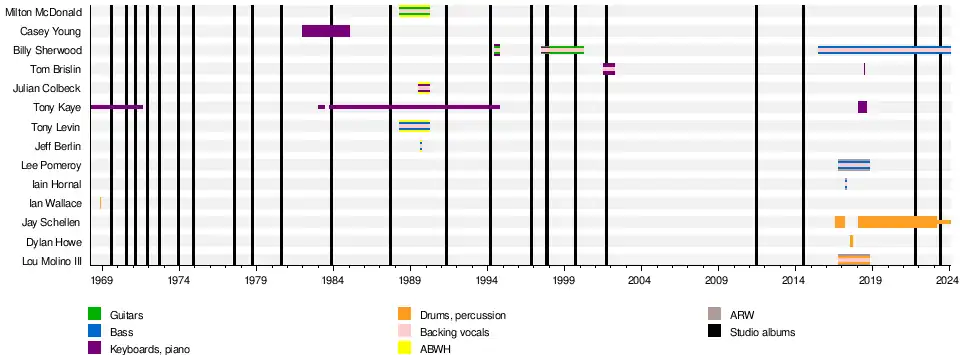
Line-ups
| Period | Members | Releases |
|---|---|---|
| 1968 |
|
none – live performances |
| 1968 |
| |
| 1968–1970 |
|
|
| 1970–1971 |
|
|
| 1971–1972 |
|
|
| 1972–1974 |
|
|
| 1974–1976 |
|
|
| 1976–1980 |
|
|
| 1980–1981 |
|
|
| 1981–1983 disbanded | ||
| 1983 |
|
|
| 1983 |
|
none – rehearsals only |
| 1983–1988 |
with
|
|
| 1988–1990 |
|
none – rehearsals only |
| 1990–1992 |
|
|
| 1992–1995 |
with
|
|
| 1995–1997 |
|
|
| 1997 |
|
|
| 1997–2000 |
|
|
| 2000 |
|
|
| 2000–2002 |
with
|
|
| 2002–2004 |
|
|
| The band were on hiatus between 2004 and 2009 | ||
| 2009–2011 |
|
|
| 2011–2012 |
|
|
| 2012–2015 |
|
|
| 2015–2022[88] |
with
|
|
| April 7, 2017 (performing "Roundabout" and "Owner of a Lonely Heart" at their induction into the Rock and Roll Hall of Fame) |
with Geddy Lee - bass on "Roundabout" (guest) |
Bill Bruford (drums/percussion) and Tony Kaye (keyboards) were also inducted. Bruford attended but did not perform, while Kaye did not attend. |
| 2022–present |
|
|
Bands closely related to Yes
There have been two occasions when a line-up of former Yes members has competed with the official line-up of Yes. These bands included former Yes members, performed/perform Yes music and presented/present themselves within the context of Yes' history.
| Band/Period | Members | Releases |
|---|---|---|
| Cinema: 1982–1983 |
|
|
| Anderson Bruford Wakeman Howe: 1988–1990 |
|
|
| Bill Bruford and Steve Howe (as "Yes"): 1992 |
with
|
|
| Steve Howe, Chris Squire and Alan White of Yes: 2008 |
|
no recordings, live performances only |
| Yes feat. Jon Anderson, Trevor Rabin & Rick Wakeman: 2010–2018[93] |
|
|
References
- 1 2 3 Welch 2008, pp. 52–53.
- ↑ Welch 2008, p. 315
- ↑ Welch 2008, p. 77.
- ↑ Welch 2008, p. 315
- ↑ Welch 2008, p. 80.
- ↑ "Interview with Peter Banks by Mark Powell". Cherry Red TV. Archived from the original on 11 December 2021. Retrieved 21 September 2017.
- ↑ Welch, 2008, p. 89
- ↑ Welch 2008, p. 109.
- ↑ Tobler, John (1992). NME Rock 'N' Roll Years (1st ed.). London: Reed International Books Ltd. p. 229. CN 5585.
- ↑ "No Yes" (PDF). Sounds. 23 October 1971. p. 2. Retrieved 24 July 2022 – via World Radio History.
- ↑ Rick Suchow (March 2013). "Chris Squire Takes A Straight And Stronger Course". Bass Musician Magazine. V.I.E., LLC. Retrieved 22 September 2017.
- ↑ "Yes' Alan White Exclusive Interview: Modern Drummer Magazine". Moderndrummer.com. 18 May 2005. Retrieved 22 September 2017.
- ↑ "BRIT Certified – bpi", search "Tales from Topographic Oceans"
- ↑ "Number 1 Albums – 1970s". The Official Charts Company. Archived from the original on 30 December 2009. Retrieved 11 February 2012.
- ↑ Howe 2021, p. 108.
- ↑ "News Briefs". Billboard. 31 August 1974.
- ↑ "YES | full Official Chart History | Official Charts Company". www.officialcharts.com. Archived from the original on 14 October 2022. Retrieved 14 October 2022.
- ↑ "An Interview with Chris Squire of YES – March 19, 2014". Lithium Magazine. 21 March 2014. Archived from the original on 22 March 2014. Retrieved 22 March 2014.
- ↑ Welch, Musicians Only, 14 June 1980, p. 5.
- ↑ Horn, Trevor (2022). Adventures in Modern Recording. UK: Nine Eight Books. p. 95. ISBN 978-1-7887-0603-2.
- ↑ "Trevor Rabin – Capturing adrenaline". Innerviews.org. Retrieved 22 September 2017.
- ↑ "Trevor Rabin – Capturing adrenaline". Innerviews.org. Retrieved 22 September 2017.
- ↑ "Web dedicada a la Música de Cine y Bandas Sonoras". ScoreMagacine.com. 22 September 2005. Retrieved 22 September 2017.
- ↑ Yesyears documentary 1991.
Chris Squire on Big Generator: "It was supposed to come out a year before it did, which would've been better timing"
- ↑ Chambers 2002, p. 112
- ↑ Catlin, Roger (18 April 1991). "Yes: a weird return of '70s once-weres and '80s wanna-bes". Hartford Courant. p. 4. Retrieved 11 April 2019 – via Newspapers.com.
- ↑ Welch 2008, pp. 324–325
- ↑ Welch 2008, p. 420
- ↑ Sutcliffe, Phil (5 March 1991). "Stories". Q Magazine. 55: 12–13.
- ↑ Welch 2008, p. 336
- ↑ DeRiso, Nick (10 May 2014). "Trevor Rabin and Jon Anderson on Yes' Most Overlooked Album". Something Else!. Retrieved 9 October 2022.
- ↑ "Something Else! Interview: Billy Sherwood, Formerly of Yes". News.allaboutjazz.com. 13 October 2011. Retrieved 22 September 2017.
- ↑ "YES | full Official Chart History | Official Charts Company". www.officialcharts.com. Archived from the original on 14 October 2022. Retrieved 14 October 2022.
- ↑ "Yes Billboard Albums". Allmusic. Archived from the original on 30 April 2016. Retrieved 12 October 2022.
- ↑ "Yes Keyboardist Needs To Keep His Hands On The Keys". The Washington Post. Daily Press. 26 July 2000. Retrieved 22 September 2017.
- ↑ "Touchy-Feely Musician Gets Slapped". Pollstar. 26 July 2000. Retrieved 22 September 2017.
- ↑ "Yes in the Press". Zenponies.com. 28 July 2000. Retrieved 21 September 2017.
- ↑ Tiano, Mike (14 July 2002). "Conversation with Rick Wakeman". Notes from the Edge. Retrieved 9 December 2017.
- ↑ "Billboard Spotlight: Yes 35th Anniversary". Billboard. Nielsen Business Media Inc. 1 November 2003. pp. 45–46, 48–50, 55–59.
- ↑ "2004 concert with Trevor Horn". YouTube. Archived from the original on 11 December 2021. Retrieved 22 September 2017.
- ↑ "Trevor Horn and Friends: Slaves to Rhythm". Popmatter.com. 23 July 2009. Retrieved 22 September 2017.
- ↑ Howe 2021, p. 234.
- ↑ "Yes cancel 40th anniversary tour". NME. 4 June 2008. Retrieved 22 September 2017.
- ↑ Rob Rockitt (12 September 2008). "Yes To Tour With Replacement Singer". Hard Rock Hideout. Retrieved 22 September 2017.
- ↑ Mal Westerly (12 February 2009). "Prog Rockers YES Cancel Slate of Gigs". MusicNewsNet.com. Retrieved 22 September 2017.
- ↑ "Chris Squire". Radio Swiss Jazz. Retrieved 22 September 2017.
- ↑ "Yes". Aural Moon. Retrieved 22 September 2017.
- ↑ "Yes revisit 2010 recordings for new album From A Page". Louder Sound. 25 October 2019.
- ↑ Genbe Triplett. "Yes, Peter Frampton performing at Lucky Star Casino in Oklahoma". NewsOK.com. Retrieved 22 September 2017.
- ↑ Earl Dittman. "On the road again, Prog-rockers Yes say 'no' to calling it quits". DigitalJournal. Retrieved 22 September 2017.
- ↑ Cashmere, Paul (8 February 2012). "EXCLUSIVE: Yes Recruit Another New Singer". Noise11. Retrieved 8 February 2012.
- ↑ Ramsey, Bill (13 September 2012). "Glass Hammer Singer is Yes Frontman". The Pulse » Chattanooga's Weekly Alternative. Retrieved 13 October 2022.
- ↑ "Lords of Metal ezine". Lordsofmetal.nl. Retrieved 22 September 2017.
- ↑ "Twitter / asiageoff: See ya Los Angeles! Done my". Twitter. Retrieved 22 September 2017.
- ↑ "Tour Dates | Yes U.S Summer Tour 2014 on JamBase". Jambase.com. Retrieved 22 September 2017.
- ↑ "Billy Sherwood announces involvement in next Yes album on Facebook". 5 March 2014. Archived from the original on 26 February 2022. Retrieved 22 September 2017.
- ↑ "Yes US 2014 Summer Tour: Fragile, Close To The Edge, Heaven & Earth". Yesworld.com. 24 March 2014. Retrieved 22 September 2017.
- ↑ Daniel Kreps (28 June 2015). "Chris Squire, Yes Bassist and Co-Founder, Dead at 67". Rolling Stone. Archived from the original on 21 March 2016. Retrieved 22 September 2017.
- ↑ "Yes Continues On After Death of Bassist Chris Squire: 'Absolutely We're Moving Ahead'". Billboard. 21 July 2015. Retrieved 22 September 2017.
- ↑ Wakeman, Rick (6 February 2010). Rick's Place. Event occurs at 10:00 a.m.–12:00 a.m. Planet Rock.
- ↑ "Double the Yes? Jon Anderson Says No Problem!". Ultimate Classic Rock. 20 February 2018. Retrieved 29 June 2018.
- ↑ "Trevor Horn to join Yes on stage at Royal Albert Hall". Interactive Guitar Magazine. 2016.
- ↑ Colin Stutz (18 July 2016). "Yes Drummer Alan White Bows Out of Summer Tour After Surgery, Will Rejoin 'In the Near Future'". Billboard. Retrieved 22 September 2017.
- ↑ "All My Yesterdays", by Steve Howe, Omnibus Press, 2020, p. 290
- ↑ "YES announce Japanese Tour in November 2016". yesworld.com. September 2016. Retrieved 22 September 2017.
- ↑ "Alan White rejoins YES for Japan Tour & Cruise To The Edge". Facebook. 14 October 2016. Archived from the original on 26 February 2022. Retrieved 22 September 2017.
- ↑ Jeff Giles. "Yes Announce Summer 2017 'Yestival' Tour Dates". Ultimate Classic Rock. Retrieved 22 September 2017.
- ↑ "YES Drummer Alan White Welcomes Dylan Howe To Join Rhythm Section For North American Yestival Tour". Bravewords. 26 July 2017. Retrieved 22 September 2017.
- ↑ Crow, Johnnie (29 May 2018). "#YES50: Celebrating 50 Years of Yes". The Rock Revival. Retrieved 29 May 2018.
- ↑ "YES: 50th-Anniversary Tour To Feature TONY KAYE As 'Special Guest'". Blabbermouth.net. 2 May 2018.
- 1 2 "#YES50 TOUR commences Tuesday 13th March". Yesworld.com. 9 March 2018. Retrieved 11 March 2018.
- ↑ "Who's ready for Patrick Moraz AND Tony Kaye with YES, live in Philadelphia on July 20 & 21?". Yes' official facebook. 24 May 2018. Archived from the original on 26 February 2022. Retrieved 25 May 2018.
- ↑ "YES/イエス – CELEBRATING 50 YEARS OF YES". UDO Artists. Retrieved 25 October 2018.
- ↑ "Tony Kaye Talks 50 Years Of YES and More". Yesworld.com. 22 May 2018.
- ↑ "TONY KAYE, founder member of YES is Special Guest for the band's 2018 #YES50 50th Anniversary". Yes' official facebook. 1 November 2017. Retrieved 2 November 2017.
- ↑ "MESSAGE FROM ALAN WHITE". Yes' official facebook. 2 January 2018. Archived from the original on 26 February 2022. Retrieved 2 January 2018.
- ↑ "TREVOR HORN TO REJOIN YES FOR THREE ANNIVERSARY SHOWS". Ultimate Classic Rock. Retrieved 13 March 2018.
- ↑ Ewing, Jerry (26 May 2022). "Yes drummer Alan White dead at 72". Prog. Retrieved 26 May 2022.
- ↑ Ewing, Jerry (8 March 2022). "Yes announce they'll celebrate 50 years of Close To The Edge this June". Prog. Retrieved 15 February 2023.
- ↑ Ewing, Jerry (21 April 2022). "Yes reschedule Relayer live European dates for 2023". Prog. Retrieved 15 February 2023.
- ↑ "Alan White – Celebrating His Life and Music". Seattle Theatre Group. Retrieved 22 September 2022.
- ↑ Ewing, Jerry (14 February 2023). "Drummer Jay Schellen joins Yes on a permanent basis". Prog. Retrieved 14 February 2023.
- ↑ "Jay Schellen Joins YES as a Permanent Member". YesWorld. Retrieved 17 February 2023.
- 1 2 Yes- Trevor Horn Concert 2004 (HQ), retrieved 12 June 2022
- 1 2 3 Yes perform "Owner of a Lonely Heart" at the 2017 Rock & Roll Hall of Fame Induction Ceremony, retrieved 12 June 2022
- ↑ "Home". yesfeaturingarw.com.
- ↑ "ARW Change Name to 'Yes Featuring Jon Anderson, Trevor Rabin, Rick Wakeman'".
- 1 2 Ewingpublished, Jerry (26 May 2022). "Yes drummer Alan White dead at 72". loudersound. Retrieved 26 May 2022.
- ↑ "Ian Wallace • Obituary (Pierre Perrone in 'The Independent', 28 February 2007)". Procolharum.com. Retrieved 24 May 2016.
- 1 2 Ewingpublished, Jerry (10 August 2022). "Revisiting the car-crash moment Yes inadvertently performed as a power trio on live TV". loudersound.
- ↑ "What Was it Like Playing Keyboards for Yes? A Conversation with Tom Brislin". reverb.com. 26 April 2016. Retrieved 22 October 2022.
- ↑ Ewingpublished, Jerry (14 February 2023). "Drummer Jay Schellen joins Yes on a permanent basis". louder. Retrieved 27 April 2023.
- ↑ "Ticket Image". Retrieved 26 August 2019 – via Ebay.
Bibliography
- Welch, Chris (2008). Close to the Edge – The Story of Yes. Omnibus Press. ISBN 978-1-84772-132-7.
- Chambers, Stuart (2002). Yes: An Endless Dream of '70s, '80s and '90s Rock Music: An Unauthorized Interpretative History in Three Phases. General Store Publishing House. ISBN 978-1-894-26347-4.
- Howe, Steve (2021). All My Yesterdays. Omnibus Press. ISBN 9781785581793.
Notes
- ↑ Schellen covered for Alan White when the drummer couldn't tour due to heath issues in 2016 and stayed when the drummer made a recovery and performed alongside him.
- ↑ Keitel, Brislin and the European Festival Orchestra joined the band on their Symphonic tour, Brislin performed on behalf of Rick Wakeman who was busy with his own tour at the time.[91] The European Festival Orchestra just played on the European leg of touring, with local orchestral players playing on North American dates.
.jpg.webp)
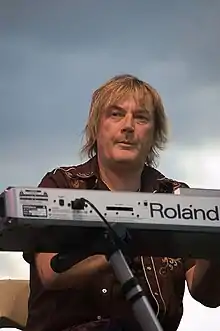
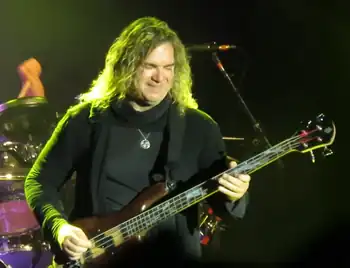


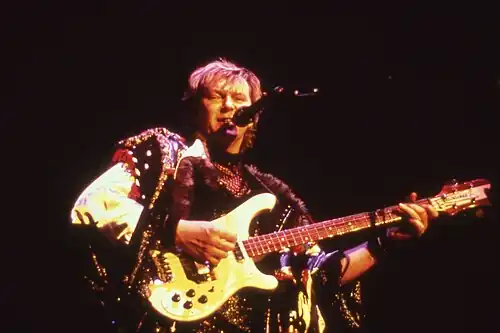


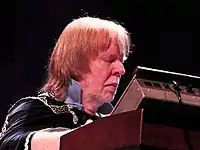
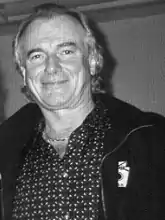
.jpg.webp)
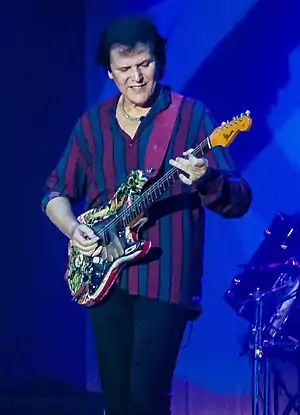
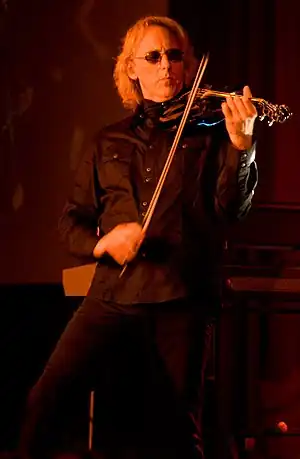
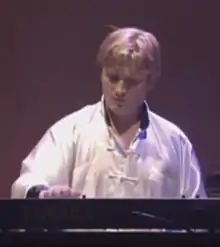
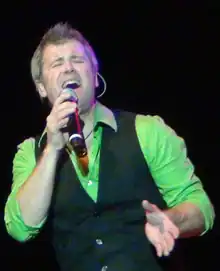
.jpg.webp)
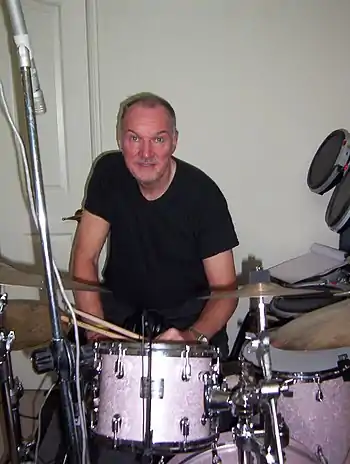

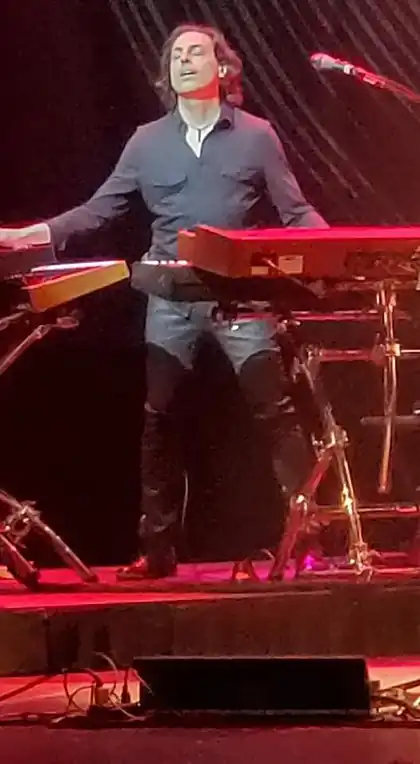
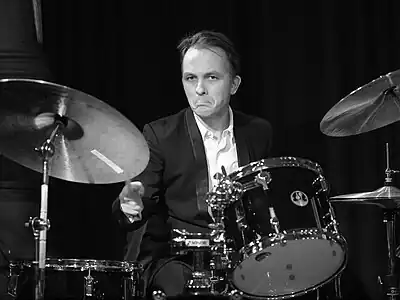
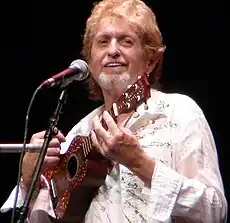
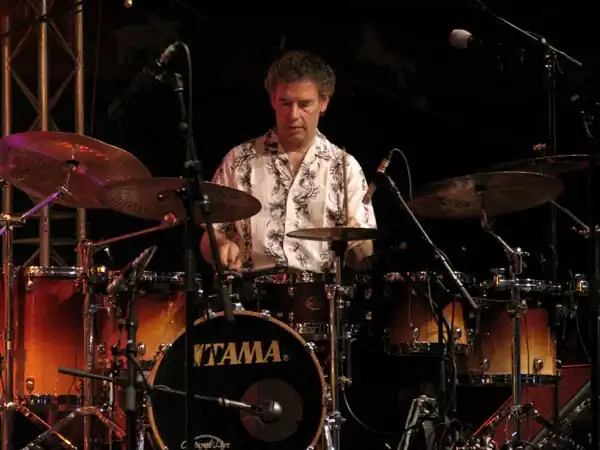
.jpg.webp)
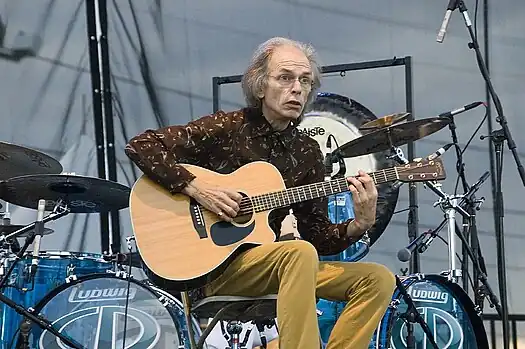
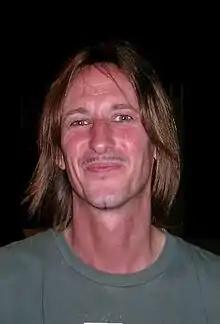
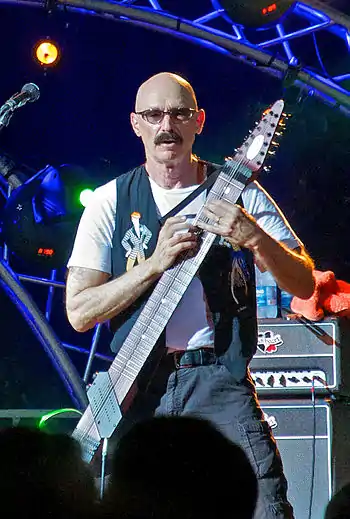
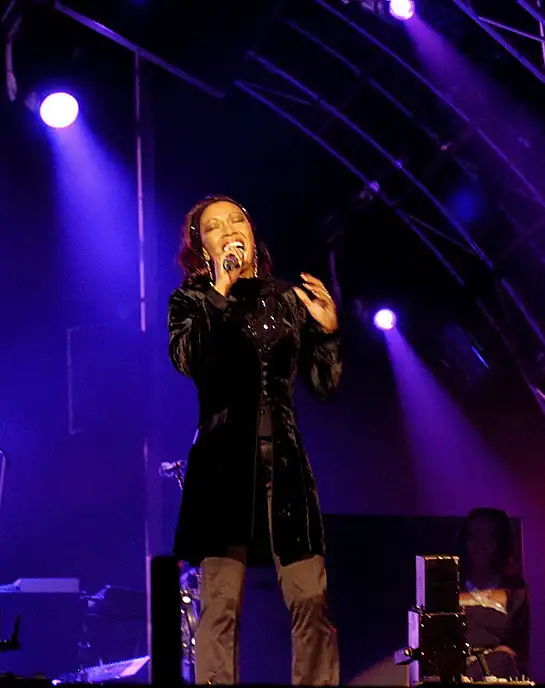
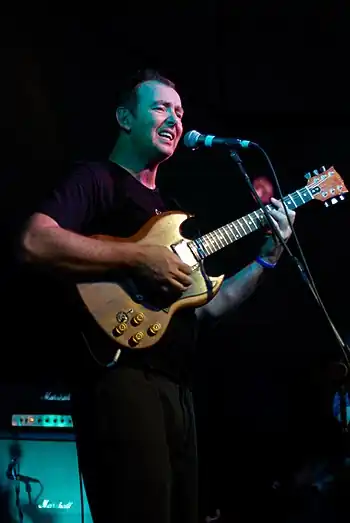
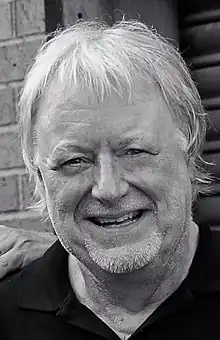
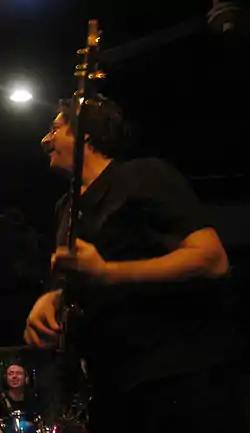
.jpg.webp)
.jpg.webp)
.jpg.webp)

.jpg.webp)

